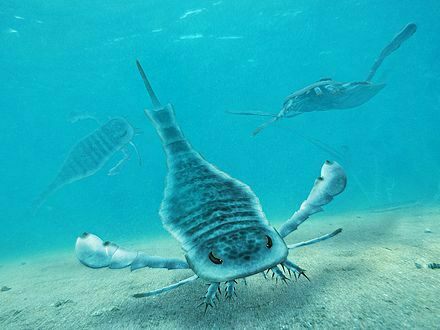This Specimen has been sold.
13.9" Palmichnium (Fossil Arthropod Trackway) Plate - Oklahoma
Palmichnium are the fossilized trackways of arthropods, in this case it waslikely a eurypterid (sea scorpion) responsible for the impressions.
The divots that run diagonally to the midline of the track are created by the long, club-like walking arms of the eurypterid. This Palmichnium is preserved on a thin slab of sandstone, and was collected from the Hartshorne Sandstone in Oklahoma and would be Pennsylvanian in age, or approximately 305 million years old.
There are multiple trackways visible on the mudstone with the longest one being about 11" long.
Comes with the pictured, metal display stand.
The divots that run diagonally to the midline of the track are created by the long, club-like walking arms of the eurypterid. This Palmichnium is preserved on a thin slab of sandstone, and was collected from the Hartshorne Sandstone in Oklahoma and would be Pennsylvanian in age, or approximately 305 million years old.
There are multiple trackways visible on the mudstone with the longest one being about 11" long.
Comes with the pictured, metal display stand.
About Eurypterids
Eurypterids, commonly known as sea scorpions, are an extinct group of arthropods related to arachnids that include the largest known arthropods to have ever lived. Prevalent during the Silurian and Devonian, eurypterids were segmented aquatic arthropods with compound eyes and two club-like "arms." Some species exhibit toothed claws and may therefore have been predators. Eurypterus remipes is the state fossil of New York?
Eurypterids, commonly known as sea scorpions, are an extinct group of arthropods related to arachnids that include the largest known arthropods to have ever lived. Prevalent during the Silurian and Devonian, eurypterids were segmented aquatic arthropods with compound eyes and two club-like "arms." Some species exhibit toothed claws and may therefore have been predators. Eurypterus remipes is the state fossil of New York?
SPECIES
Unknown
LOCATION
Haskell County, Oklahoma
FORMATION
Hartshorne Sandstone
SIZE
Longest Trackway: 11", Rock: 13.9 x 12.2"
CATEGORY
ITEM
#197462
We guarantee the authenticity of all of our specimens.
 Reviews
Reviews












